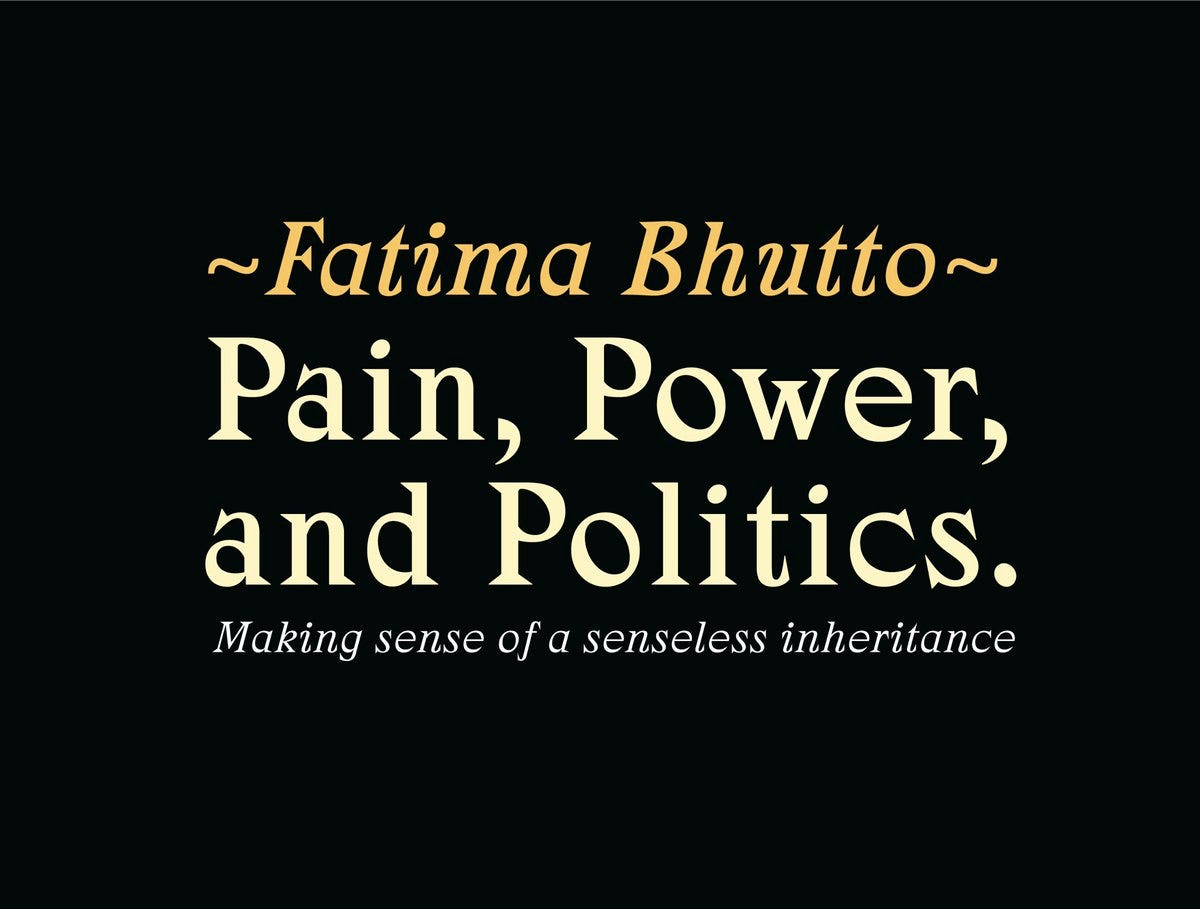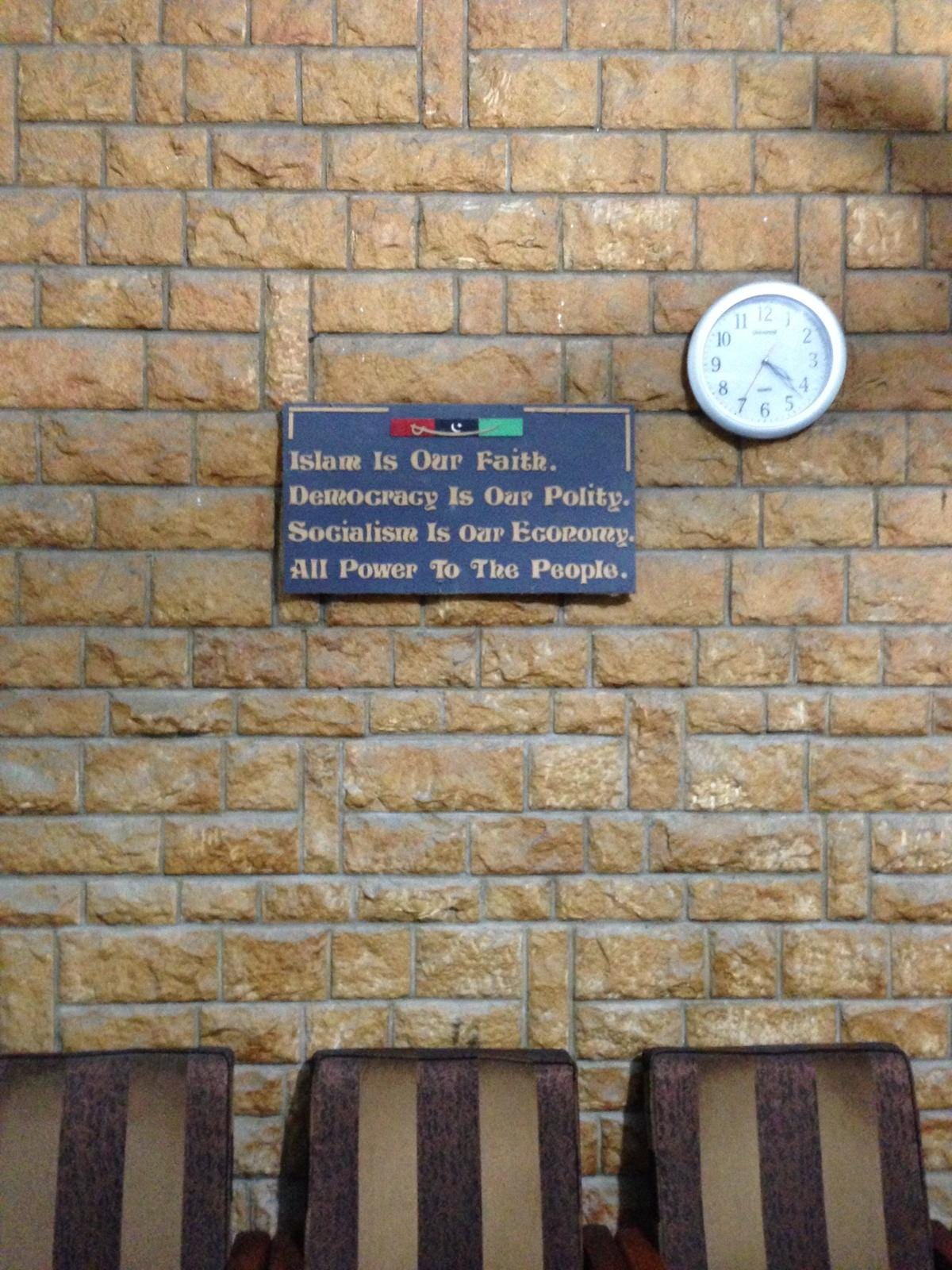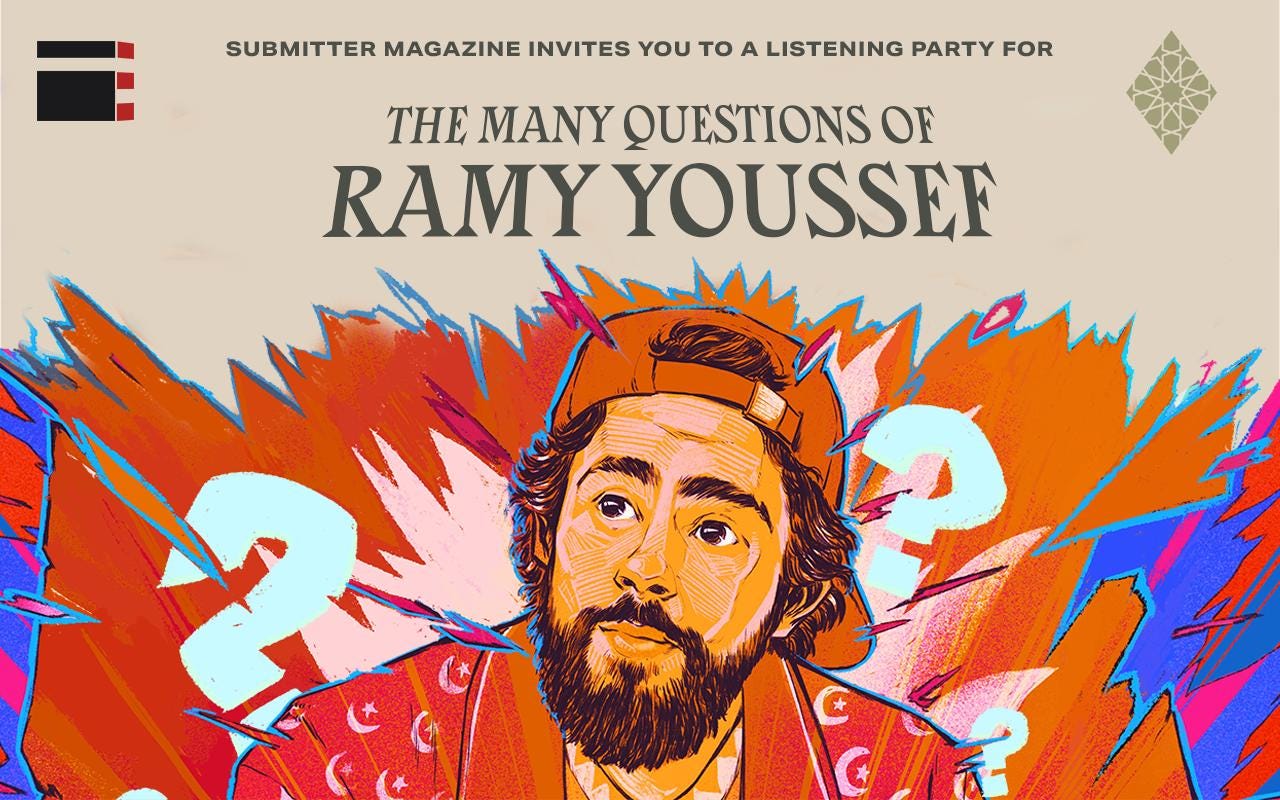Making Sense of a Senseless Inheritance
Fatima Bhutto in conversation with Imran Ali Malik for Submitter Magazine
I live my life in widening circles
that reach out across the world.
I may not complete this last one
but I give myself to it.
I circle around God, around the primordial tower.
I’ve been circling for thousands of years
and I still don’t know: am I a falcon,
a storm, or a great song?
Rainer Maria Milke,
Book of Hours, 12
♢♢♢
“Pandemics have forced humans to break with the past and imagine their world anew. This one is no different. It is a portal, a gateway between one world and the next.”
- Arundhati Roy,
The Pandemic is a Portal
♢♢♢
“If I attach to the idea of myself as someone who suffered, then I’ll always be suffering.”
-Fatima Bhutto,
In Conversation with Imran Ali Malik for Submitter Magazine
In the name of God, the Merciful, the Compassionate

In a year of pandemics and protests, so many of us are reckoning with old ghosts— inheritances we’ve lived with all of our lives, but have thus far been able to put off examining too closely.
Whether it’s the inheritance of capitalism or white supremacy, or of family history and our relationships, being inside and being slowed down has given us time to reflect, to remember, and reckon with our language and our culture. We are all forced to look at ourselves and our surroundings anew. How are we to make sense of the beauty, the pain, the overwhelming sense of loss, and of powerlessness?
This is what the Pakistani writer Fatima Bhutto has done all of her life: making sense of her many inheritances—a powerful political legacy, both generative and dark, and at once both painful and powerful, and the life of exile with a father who loved and raised her dearly and was gunned down by the police. She found a way to break through her sorrow and confusion by creating language to eulogize the dead and frame the unframeable. But most of all, she found a way to make sense of the senseless inheritances of violence and politicized cultural artifacts that enshrine not just her life, but the lives of the countless whose world is shaped by the militant politics and religious cultures of Pakistan.
The last time I saw Fatima was in November of 2012. We sat in the 20,000 volume library of her grandfather, the late Zulfikar Ali Bhutto, the famous home on 70 Clifton Road, in Karachi, Pakistan. The walls, lined with shelves, with books Fatima tells me comprise what we might call a ‘decolonized library.’ He had sections devoted to Africa, Asia, and South America, along with a relatively smaller section dedicated to America, where you’d find the works of James Baldwin-- one of his favorite writers.
On the wall outside of the library hung a plaque bearing the slogan of the Pakistan People’s Party: “Islam is our religion. Democracy is our polity. Socialism is our economy. All power to the people.”

Photo from Zulfikar Ali Bhutto’s library, from Imran Ali Malik
The books, photographs, and plaques all intimated a portrait of a man who dreamed of a collective, free future not just for Pakistan, but for the Global South. His efforts were cut short when a CIA-backed military coup was staged in 1977 to overthrow the democratically elected Bhutto, and General Zia ul-Haq was put in power, ushering in Pakistan’s third military dictatorship in its short history. The dream experienced its first death when, in 1979, Zulfikar Ali Bhutto was hanged, three years before Fatima Bhutto was born.
When she was three years old, her uncle Shahnawaz was poisoned. When she was fourteen years old, her father Murtaza Bhutto was gunned down in the driveway of that house that still holds her grandfather’s library. Some twenty years after that, her aunt, Benazir Bhutto, a former Prime Minister of Pakistan, was assassinated.
In her early years, Fatima was raised in exile in Damascus, and later returned to Karachi, where she still lives in the house of her grandfather. Her first publication, a collection of poetry, was published the year of her father’s murder, when she just 15 years old.
Her first major book came twelve years later— a memoir about her father and her family, titled Songs of Blood and Sword. She has since published two novels, The Shadow of the Crescent Moon, and her latest, The Runaways, as well as a work of cultural journalism titled New Kings of the World, an investigation on the intersection of culture and geopolitics, focusing on Turkish Dizi (Ertugrul, et al.), Bollywood, and K-Pop, tacking the decline of the centrality of American culture.
Throughout her life, Fatima Bhutto has lived in the shadow of a powerful and bloody political dynasty, but vowed early on never to take a literal political stage herself. Rather, she sufficed herself to live as a figure in the corner, thinking her dangerous thoughts, and writing her dangerous books. As a result, Fatima Bhutto is a person today whose language, in whichever medium her pen chooses, serves to contain the raw emotion and power of someone catapulted by this unbelievable history that precedes her. It was truly a joy and honor to have this conversation with Fatima, and I hope you all like it, too.
Below is an except of our conversation, which can be listened to in its entirety here
You can also read a longer excerpt of our interview on our website, submittermag.com
If you’d like to continue this conversation with me, I’d love to hear from you.
-Imran Ali Malik (imran@submittermag.com)
—♢—
IMRAN
There’s a link to be made with the structuring of American society where you have this historical class of people who were enslaved and are still fighting for recognition. There are two Americas. There are two polices. One class calls the police for help and the other runs from the police.
FATIMA
Yeah. Absolutely. In Pakistan, I can’t ever say I’ve ever met a policeman with anything but fear. People don’t call the police for help. They call their neighbors for help. They call their friends from home.
The police are a mercenary force. I think this is a global thing. I think so many of these things are global. And one of the things that really struck me about watching the protests in America was that some of the predator drones that ordinarily surveil the U.S. Canadian border were called back and were brought to surveil the protests and were flown over cities where you had big protests. And to me, that was just such a revealing news story.
That’s exactly why Americans should care about predator drones that are sent to fly over Pakistan and Afghanistan, and Somalia because you know, they’re not just using them against us.
They’re going to use them against you, too.
And the same rules of violence, the same tools of surveillance, the same tools of oppression, those are not going to be restricted to places far away from home. They use them at home if they need to as well.
IMRAN
I’m reminded of the quote: “The struggle against a man’s struggle against power is the struggle of memory against forgetting” from Milan Kundera.
FATIMA
I’ve always thought that [quote] said so much. I think, unfortunately, we live in a culture of amnesia, a culture that supports forgetting, that of distraction. And a culture of the self that’s always pushing us to some kind of performance, some kind of public performance or visibility.
I think part of it is an understanding or empathy for the difficulties of others.
I think that one of the weird things of lockdown and this social distancing is that it’s going to have to make us much more tender in our speech, in our conversation.
I hope it makes us more tender.
IMRAN
How do you let go of your sense of self? Or how do you understand your sense of self?
FATIMA
I think by understanding that there is no self. I mean, I’m not the same person I was 10 years ago. I’m not the same person I was 10 days ago. I’m not even the same person I was 10 minutes ago because what I am is just a confluence of different thoughts that are swirling around at any given time. And if I attached to one of them, that’s what causes pain.
If I attach to the idea of myself as someone who suffered, then I’ll always be suffering.
I’ll give you an a less abstract example. I suffered a very long time with the idea of justice because of what happened to my father, who I adored and who was killed outside of my front door.
My father was killed on the road that, anytime I leave my house, I’ve got to walk on that road. I can’t escape the memory of where my father was killed and I suffered for so long because his killers were free.
I kept suffering because I believed in this idea of justice as singular, as one kind of justice. And actually at some point it occurred to me that if I was to have the justice I felt I deserved, then someone else’s daughter would suffer.
And I thought there is one difference between me and the men who killed my father: I would never do that to someone’s daughter.
Read the longer excerpt here and Listen to the full conversation on the American Submitter podcast feed.
What We’re Reading
how to disappear completely by Amir Sulaiman
From the collection Love, Gnosis, and Other Suicide Attempts
then I realized I was a body
but that is not the truth of the truth
then I realized I am a spirit in a body
but that is not the truth of the truth
then I realized I am a body in a spirit
but that is not the truth of the truth
then I realized my spirit and body are one and the same
but that is not the truth of the truth
then I realized that neither I, my body, my spirit, nor my realizations
exist at all
there is only the truth of the truth
my God
what am I to do
how does one go about ceasing to exist
if they have never existed at all
♢
I find myself reflecting on Fatima's thoughts on making sense of pain and letting go of the self. I find her thoughts echoed in this poem by one of my favorite poets, Amir Sulaiman. Both Fatima and Amir have revealed secrets of the human condition to us. This is the role of writers and poets: to uncover that which is buried deep within and recover that which has been forgotten.
- Zahra
(Who has articulated what's in your heart? Talk to me about tender words, zahra@submittermag.com)
Invisible Cities by Italo Calvino
“Arriving at each new city, the traveler finds again a past of his that he did not know he had: the foreignness of what you no longer are or no longer posses lies in wait for you in foreign, unpossessed cities.”
“There is the city where you arrive for the first time; and there is another city with you leave never to return. Each deserves a different name; perhaps I have already spoken of Irene under different names; perhaps I have only spoken of Irene.”
Invisible Cities is brief yet prolific, by virtue of the prose. Italo Calvino takes us on a journey to imaginary cities, and the more you read, the more you realize he’s taking us on a journey within ourselves: Cities are the stories of people are the stories of cities.
As a lover of cities, another reason this book touched me is because of the new relationship we’ve all developed with our cities since the beginning of quarantine. This book helps us imagine new possibilities and ways of thinking of what our cities can be. In the midst of a public health crisis, social unrest, and economic instability, reimagining our cities—our worlds—and thinking of how we can create a more harmonious, just, and beautiful way of living is of paramount importance.
-Farooq
(If you’d like to discuss cities, this book, or other books that have touched you, reach out at farooq@submittermag.com)
What We’re Listening To
Rabbit Hole - A podcast from the New York Times
The central question of Rabbit Hole is what is the internet doing to us? This podcast explores online radicalization, conspiracy theories, the way YouTube algorithms trap us in silos, QAnon, and much more. The hosts speak to people who’ve been stuck within these rabbit holes, the CEO of YouTube, software engineers behind these algorithms, and many others.
In a way, you can draw a connection between Rabbit Hole, and Fatima Bhutto’s most recent novel, The Runaways, which also explores themes of radicalization, and tells the human stories behind that process.
-Farooq
(If you’d like to discuss tech, algorithms, social media, and the technological future, this is one of my favorite topics, and something I hope to study further in law school. Reach out to continue the conversation at farooq@submittermag.com)
Bruce Wayne - by Memorecks ft. Jenna Pemkowski
To keep it real with you all, I just really love the rhythm and instrumental of this song. It’s catchy, up beat, and I love running to it. Nothing more, nothing less.
- Farooq (let’s talk music, running, and guilty pleasures (👀 ) at farooq@submittermag.com)
Coming From Submitter Magazine
Listening Party for The Many Questions of Ramy Youssef

Join us this Thursday, July 2nd, at 3pm PST to listen to the upcoming episode of American Submitter, "The Many Questions of Ramy Youssef" with producers Imran Ali Malik and Zahra Parekh a day before its official release. Sign up and we will send you the link to the Zoom call later this week. We look forward to having you, God willing.
♦
Click here to subscribe to The Submitter and please consider becoming a patron of our work.

